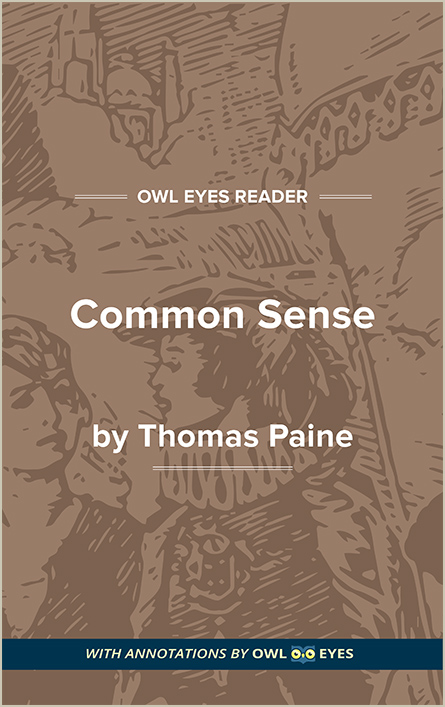Study Guide
Analysis Pages
Thomas Paine Biography
Thomas Paine was the son of Frances Cocke and Joseph Paine. After grammar school, at the age of thirteen, he was apprenticed in his Quaker father’s trade as a corset maker until he left home at nineteen. After that he was briefly a privateer, a schoolmaster, a grocer, and a tobacconist. He also worked as an exciseman to patrol the coastline against smugglers; during this time he was twice discharged, the second time from lobbying at Parliament for higher salaries for excisemen. He was twice married, first, to Mary Lambert, who died within a year of their marriage in 1759, and then in 1771 to Elizabeth Ollive, from whom he was legally separated in 1774. He met Benjamin Franklin at Westminster, who gave him letters of introduction when Paine left for America in 1774.
After his arrival at Philadelphia, Paine edited The Pennsylvania Magazine, contributed articles to the Pennsylvania Journal on recent inventions, in which he was widely read, and wrote miscellaneous papers. Publication of Common Sense in 1776 established his fame and probably sold 500,000 copies at a loss. He urged America’s moral obligation to the world to seek independence for its own sake and to free the almost uncontaminated continent from monarchy by the establishment of a strong federal republic. Enlisting in the Continental army in the same year, he began The American Crisis essays with the phrase “These are the times that try men’s souls.”
Common Sense was one of the first decisive calls in the Colonies for independence and revolution. The logic and language influenced the writing of the first draft of the Declaration of Independence. The sixteen essays collected in The American Crisis rallied the public and the demoralized army during the dark period of the revolution between 1776 and 1780. George Washington, knowing that Paine’s potent voice could lend persuasion and articulation to the cause of independence, ordered the pamphlet to be read to all the troops. Paine was the most influential propagandist of the American Revolution.
While he was secretary of the Continental Congress, 1777-1779, Paine became needlessly embroiled in disputes concerning the administration of secret French aid and was dismissed from his post at the request of the French. Clerk of the Pennsylvania Assembly, 1779-1781, he resigned to undertake a brief mission to France. After the Revolutionary War, New York gave him a farm at New Rochelle, and Pennsylvania gave him £500 for his services.
While living in New Rochelle and in Bordentown, New Jersey, in the years 1782-1787 he continued his writings for efficient taxation, against paper money, and for federal supervision of western lands occupied by Virginia.
He also experimented in the construction of iron bridges, which led him to England in 1787. His bridge was successful in all ways except financially. Paine was welcomed in England by Charles James Fox and Edmund Burke and in France by Jean-Antoine-Nicolas Condorcet. In reply to Burke’s condemnation of revolutionary France, Paine published in 1791 to 1792 his Rights of Man, in which he urged an English revolution to establish a republic as the only way to guarantee equal, individual rights of liberty, property, security, and resistance to oppression. This book sold about 200,000 copies and led to Paine’s being banished from England.
Although he did not speak French, Paine took advantage of his honorary French citizenship to gain election to the French Convention. Associated with the Girondists, he played a minor role, except for speaking against the execution of Louis...
(The entire page is 872 words.)
Owl Eyes subscribers get unlimited access to our expert annotations, analyses, and study guides on your favorite texts. Master the classics for less than $5/month!

